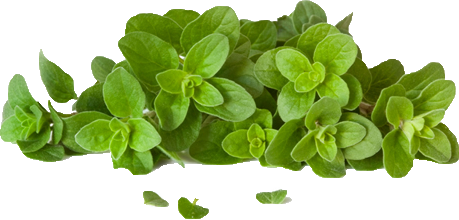|
Oregano contains
impressive list of plant derived chemical compounds that are known to have
disease preventing and health promoting properties.
The herb parts
contain no cholesterol; but are rich source of dietary fibre, which helps to
control blood cholesterol levels.
Oregano contains
many health benefiting essential oils such as carvacrol, thymol, limonene,
pinene, ocimene, and caryophyllene. The leaves and flowering stems of the plant
are strongly anti-septic, anti-spasmodic, carminative, cholagogue (help gall
bladder secretion), diaphoretic (sweat production), expectorant, stimulant, and
mildly tonic properties. Its decoction is taken by mouth for the treatment of
colds, influenza, mild fevers, indigestion, stomach upsets, and painful
menstruation conditions.
Thymol is also
been found to have anti-bacterial, anti-fungal activities.
The herb is rich
in poly-phenolic flavonoid anti-oxidants (vitamin A, carotenes, lutein, zeaxanthin
and cryptoxanthin) and has been rated as one of the plant source with highest
anti-oxidant activities. These compounds help act as protective scavengers
against oxygen-derived free radicals and reactive oxygen species (ROS) that
play a role in aging and various disease process.
The active
principles in the herb may increase the motility of the gastro-intestinal tract
as well as increase the digestion power by increasing gastro-intestinal
secretions.
This exotic herb
is an excellent source of minerals like potassium, calcium, manganese, iron,
and magnesium. Potassium is an important component of cell and body fluids that
helps control heart rate and blood pressure caused by high sodium. Manganese
and copper are used by the body as co-factors for the antioxidant enzyme,
superoxide dismutase. Iron helps prevent anaemia. Magnesium and calcium are
important minerals for bone metabolism.
Fresh herb is an
excellent source of antioxidant vitamin, vitamin-C. Vitamin C helps body
develop resistance against infectious agents and scavenge harmful,
pro-inflammatory free radicals.
Oregano is a
proven super "functional food". This herb is one of the foundation
bases of healthy Mediterranean diet in addition to olive oil, fish and lots of
greens, herbs and vegetables. It has an excellent nutritional profile; just 100
g of oregano herb provides:
Dietary
fibre- 107% (Percent of RDA) (RDA- Recommended daily
allowance)
Folates-
69%
Pyridoxine-
93%
Vitamin-C-
83%
Vitamin-A-230%
Vitamin-K-
518%
Iron- 550%
Manganese-203%
Carotene-ß-
4112 mcg.
Immune Health: Two of the most important components of oregano are rosmarinic
acid and thymol, both of which are powerful antioxidant compounds that have
been closely linked to reducing oxidative stress in the body. Free radicals are
the destructive by-products of cellular metabolism that can cause cancer and
other chronic diseases, so adding oregano to your diet by sprinkling it on your
meals can seriously improve your immune health and keep your body safe from
some of the most dangerous and silent killers.
Antibacterial
Activity: On a more basic immune system note, oregano
also has clear antibacterial properties, which are again due to the presence of
thymol and carvacrol. These important organic compounds can defend the body
against a wide range of bacteria that can affect the skin, the gut, and other
parts of the body. Oregano is also a slightly stimulating agent, which can
increase the production of white blood cells and speed up the metabolism,
making recovery from illness even faster.
Digestive Health: Oregano is packed with fibre, so despite its small size, it can
have a major impact on your digestive system. Fibre is an essential element of
a healthy digestive system, as it can increase the bulk of your stool and
stimulate peristaltic motion, which moves food through the digestive tract and
excretes it efficiently. Also, fibre helps to maintain the health of the gut
and increases nutrient uptake, so the food you eat does more for you!
Heart Health: Oregano is a natural form of omega-3 fatty acids, the beneficial
type of cholesterol that actually improves your heart health, whereas omega-6
fatty acids have a negative impact. Furthermore, omega-3 fatty acids help to
rebalance your cholesterol levels and reduce inflammation in the cardiovascular
system, thereby helping to prevent atherosclerosis, heart attacks, and strokes!
Detoxify the Body: The nutrient-rich makeup of oregano, including high content of
manganese, calcium, iron, vitamin K, fibre, and a wide range of other organic
compounds, makes this helpful herb an ideal candidate for detoxifying the body.
Research has shown that oregano can help liver function and speed up the
process of toxin elimination.
Bone Health: As we get older, our bones begin to weaken and break down, so
ensuring that we get enough vitamins and minerals in our early years is
important. Calcium, iron, and manganese are some of the most crucial minerals
for bone health, and oregano has significant amounts of all of them, making it
great for people who want to protect themselves against osteoporosis later in
life.
Energy Levels: By improving the functionality of the metabolism, thanks to
B-vitamins and its unique organic composition, the body is rejuvenated and
energized. The increase in circulation, due to the presence of iron and
increased levels of haemoglobin, helps to fully oxygenate the cells and muscles
of the body, thereby increasing energy and strength.
|

